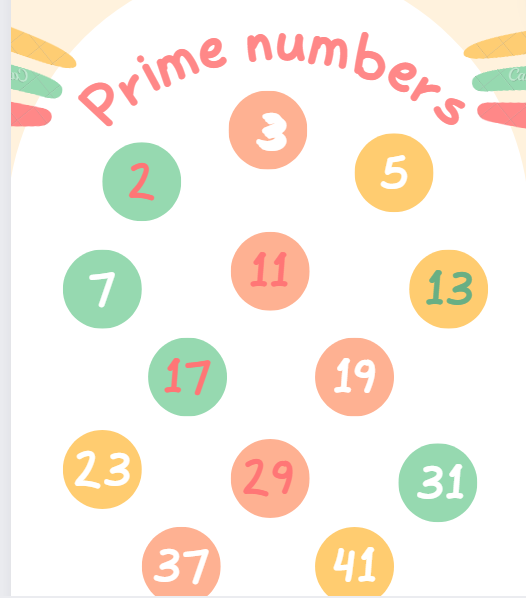- What are the first five prime numbers?
A) 0,5,7,6
B) 1,3,6,7
C) 2,3,5,7,11
D) 11.4,6,7,9
2. What is the product of the first 7 prime numbers?
A) 100
B) 250
C) 500
D) 510510
3. Which prime number is greater than 4 and ends in 5?
A) 15
B) 3
C) 25
D) 5
4. The sum of two prime numbers is always prime?
A) False
B) True
C) Can’t be predicted
D) None
5. The product of two prime numbers is always prime?
A) True
B) False
C) Can’t be predicted
D) None
6. What is the only known prime number that is a Mersenne prime and a Fermat prime?
A) 1
B) 5
C) 11
D) 3
7. How many prime numbers lie between 1 and 100?
A) 45
B) 98
C) 25
D) 28
8. How many factors does a prime number have?
A) 0 factors
B) 1 factors
C) 2 factors
D) Infinite factors
9. Prime numbers are finite?
A) Yes, prime numbers are finite.
B) No, prime numbers are infinite.
C) Only odd prime numbers are finite.
D) It depends on the size of the prime number.
10.57 is a prime number?
A) No
B) Yes
C) May or may not be
D) It depends on the problem
11. Sara is creating a secret code using prime numbers. She selects two prime numbers and multiplies them to get a composite number. If the product is 221, find the two prime numbers Sara used in her secret code?
A) 13 and 17
B) 10 and 22
C) 7 and 17
D) 19 and 5
12. If q is a prime number, what is the total number of factors that q n has?
A) n!
B) q. n
C) n2
D) n+1
13. A farmer wants to fence a rectangular field. He wants the length and width of the field to be prime numbers. If the field’s length is 7 meters and the area is 77 square meters, what is the width of the field?
A) 7
B) 9
C) 11
D) 35
14. Ava is organizing a bookshelf and decides to place her books in stacks, with each stack containing a prime number of books. If she starts with a stack of 2 books and continues adding the next prime number of books to each subsequent stack, what is the total number of books in the 6th stack?
A) 6
B) 13
C) 41
D) 57

[…] Learn more about the basic concept of Maths […]
[…] of 90?A factor is said to be prime if it is a prime number. 2 is the smallest prime factor of 90. Prime numbers are the numbers that have only 2 factors.18. Find the difference between the largest and smallest […]